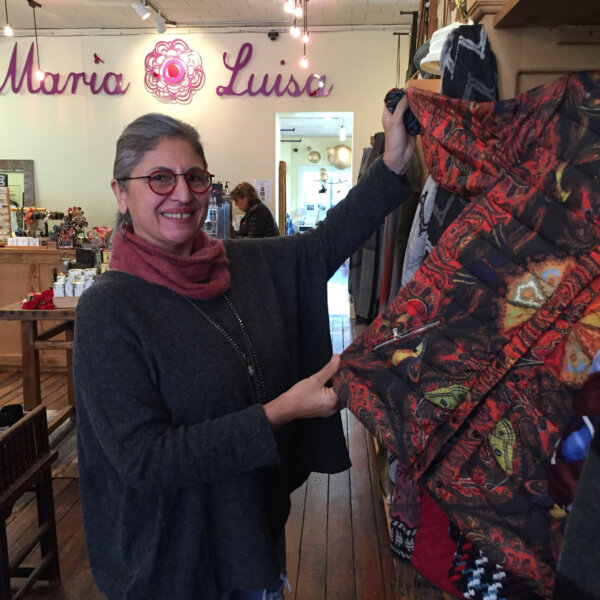 by Maddie McCann
by Maddie McCann
Her portrait confidently presides over Kelly Colquitt’s cash register with the hint of a smirk. A string of pearls peeks through her crisp white button-down, her hands are gracefully clasped over her lap. Dubbed “The Editor,” the unidentified woman is the inspiration and namesake for Colquitt’s boutique on Broadway. To step into the shop is to step into The Editor’s home, filled with clothes that would be in her closet and items that would line her shelves. Here, The Editor is three-dimensional, and her character is just as influential as her aesthetic. Her motto, Colquitt says, is “Smart girls have more fun.” She elaborates: “Part of being a smart girl in this climate is advancing your career, your agenda, your life, personal and private, knowing that the other half of the population is male.”
In late 2017, the U.S. was upended by #MeToo, the widespread movement of women empowering themselves to openly admit they had been assaulted or harassed by men. #MeToo helped destigmatize surviving sexual violence, brought powerful men who had abused women to justice, and gave previously-silenced women a platform to share stories of exploitation and intimidation. Despite all of the horror it exposed, #MeToo set the stage for a more open and welcoming world for women. And this public embrace of women applies to fashion as well. In revealing the prevalence of predatory male behavior, rhetoric about women’s clothing provoking assaults is no longer accepted. “A woman, we believe, dresses for herself,” says Colquitt. “The ones who need educating are the men, and if a woman is dressed and she’s comfortable in her own skin, that’s our goal.”
However, the fashion world has embraced #MeToo in unexpected ways. Floor-length skirts, billowing sleeves, and high necklines have become a sign of our times. A 2017 article from The New York Times—published near the height of #MeToo—concludes that the trend signifies a subversive sort of female liberation. Modesty is now viewed as a reclamation of styles that traditionally connote female oppression (a la the gowns and bonnets depicted in The Handmaid’s Tale), and it serves a functional purpose, promoting physical mobility as opposed to advertising sexuality or accentuating form.
The Times article focused on clothing created by big-name, high-end designers, like Celine, Rachel Comey, and Erdem. But two years later, the trend appears to have become more mainstream. In a July article about a popular long-sleeved, ankle-length Zara dress, the Times explicitly credits #MeToo with fashion’s movement “away from body-con and baring skin toward modesty.” But locally, post-#MeToo fashion has taken a different shape.
Neither Colquitt, Maria Luisa Whittingham (of Maria Luisa Boutique and ML by Maria Luisa), nor Gena Lisanti (of Gena Lisa Lingerie) have seen a shift toward modesty in the wake of #MeToo. They have not adjusted their inventory to favor more modest styles, and they have not noticed customers gravitating towards those kinds of items. In fact, they’ve observed a shift in the opposite direction.
Whittingham has noticed that companies that value ethical practices are on the rise, as are women-owned companies. And, with these changes in the business landscape, explicitly feminist products—like items emblazoned the phrase “Boss Babe”—have become more accessible. “Do we have all sorts of things that have empowerment messages? Probably so. Not because we suddenly changed our way of thinking, but because it’s much more available in the market now,” she says.
Just as bolder products are becoming more available, bolder fashion choices have become more visible in downtown Nyack. “I would actually say more and more women are taking chances in their wardrobe,” Colquitt says, “because I think that women are—or want to be—more confident.”
Post-#MeToo, Colquitt has noticed more customers willing to get out of their comfort zones. An off-the-shoulder dress, for example—not conducive to the average bra—might be getting more attention. A frequent question she’ll get is “‘How do I wear a bra with this?’” She says it’s progress. Now, “[customers] are more willing to explore undergarment options,” as opposed to writing off atypical or unique styles. Her store is an especially convenient environment for exploration, since Gena Lisa is right next door.
Like Colquitt, Lisanti has steadily seen more and more customers pursuing the confidence that clothing can inspire. Recently, she’s even worked with women planning on attending workshops where lingerie is the required uniform. “Now it’s like a regular thing that these seminars take place, and they are specifically meant for women that have never felt secure with their body,” Lisanti says. “Some women are really nervous in the fitting room, but when you get them put together and they see themselves, they’re like, ‘Oh my God, I can do this.’’’
Though it may seem that Nyack’s idea of empowering fashion doesn’t square with broader trends, maybe their coexistence is part of what #MeToo has achieved. Now women have more of a license for expression, regardless of what that looks like. Empowerment doesn’t have a uniform. It doesn’t necessarily mean turtlenecks and peasant skirts, nor does it mandate that a woman feel comfortable in a slip dress with lace trim. As “The Editor” might say: smart girls dress however they want.
Maddie McCann attended Nyack High School and is a recent graduate of Colorado College.








